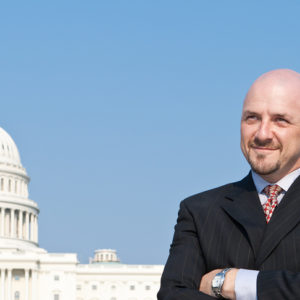It may be that “old soldiers never die, they just fade away,” but that can’t be said for politicians.
When members of Congress leave office, they don’t fade away — they rush to K Street to cash in on their time in office as lobbyists or otherwise working for Big Business.
This sad state of affairs was illustrated anew by a just-issued report from my organization, Public Citizen, which found that nearly two-thirds of recently retired members of Congress with new jobs outside of politics have spun through the revolving door to lobbying or other jobs influencing federal policy.
This second career for members of Congress is exactly as rotten as it appears to be, spurring outrage across party lines.
In that cross-partisan outrage lies the hope for reform. After our report was issued, conservative Sen. Ted Cruz — a Republican from Texas — and progressive U.S. Rep. Alexandra Ocasio-Cortez — a Democrat from New York — agreed that the problem should be addressed with a lifetime ban on members of Congress serving as lobbyists.
There’s no doubt the underlying problem is serious. Our report found that 59 percent (26 of 44) of former members of the last Congress who have found employment outside politics have taken well-paid posts at lobbying firms, consulting firms, trade groups or business groups that work to influence the federal government.
Simply put, these former lawmakers cashed in on their connections by representing wealthy special interests who can afford to pay top dollar for insider information and influence.
This is a lot more than ethically slimy. It is fundamentally corrupting, in two ways.
First, corporate interests can employ and deploy former lawmakers to win new laws, tax breaks and giveaways — or to block action in the public interest that would restrain corporate wrongdoing. Regular people have no such advantage in urging stronger food safety protections, a living wage, lower drug prices or action to address the climate crisis.
Second, when members of Congress know their future employment is going to be on K Street, they’re going to pull their punches while in office. They may talk a good game but not back up their words with action, they may quietly do favors for business interests. What they will not do is go to the mat to confront corporate wrongdoing.
Under current federal law, former federal lawmakers cannot lobby their legislative ex-colleagues for one year if they served in the U.S. House of Representatives and two years if they served in the U.S. Senate. However, they can immediately lobby executive agencies and can be hired by lobbying firms as “strategic consultants” advising lobbyists on how to approach lawmakers but avoiding lobbying contacts themselves.
Notable revolving-door lawmakers from the previous Congress include:
—Former U.S. Rep. Joe Crowley, D-New York, who was defeated by Ocasio-Cortez and works for lobbying giant Squire Patton Boggs.
—Former U.S. Rep. Lamar Smith, R-Texas, who has taken up with lobbying firm Akin Gump, where he is registered to lobby in favor of the same controversial copper and gold mine in Alaska that he pushed for while in Congress.
—Former Sen. Jon Kyl, R-Arizona, who left his lobbying job at Covington & Burling to serve in the Senate for only four months after the death of Sen. John McCain. Kyl then returned to Covington with his Senate contacts refreshed.
It’s not hard to figure out how to cure this problem: Enact a permanent or at least long-term ban on lawmakers serving as paid lobbyists for commercial interests then close the “strategic consulting” loophole. Importantly, the For the People Act (H.R. 1), which passed the House in March, would define “strategic consulting” as lobbying, closing that loophole.
But notwithstanding the H.R. 1 vote, the politics of this issue are difficult. There surely are very few Americans who think members of Congress should retain the right to cash in by becoming paid corporate lobbyists. But, on a bipartisan basis, the members themselves are very reticent to constrain their ability to cash in.
Perhaps the Ocasio-Cortez and Cruz strange bedfellows agreement will generate momentum for long-overdue reform.

